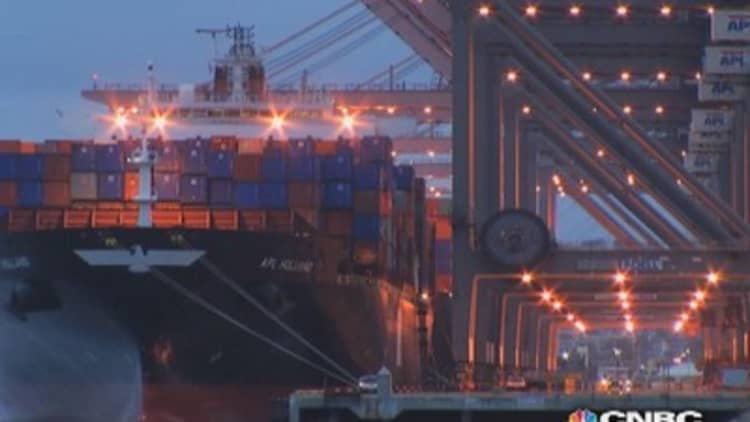
Contract talks between ship lines and dockworkers on the West Coast are showing signs of breaking down and it has businesses that move inventory through those ports worried.
"If there is a walkout or lockout it's a disaster for everybody," said Bruce Carlton, the president of the National Industrial Transportation League, a lobby group for major manufacturers.
Dockworkers on the West Coast have been working without a contract since July 1. Negotiations for a new contract have been ongoing and some progress was reported in August when the two sides announced a tentative agreement on health care benefits.
Read MoreWhy the West Coast ports matter
"There was always nervousness about these talks and there's even more nervousness now," said Jon Gold, who oversees transportation issues for the National Retail Federation.
Congestion at the ports has been growing while the talks have been under way, in part because importers increased their shipments to build up inventories in case the talks break down.
And the talks are beginning to show strain.
Ship lines and other terminal operators, represented by the Pacific Maritime Association, in a statement issued Monday accused the dock workers union of initiating "orchestrated slowdowns at the Pacific Northwest ports of Seattle and Tacoma, severely impacting many of the largest terminals during the peak holiday shipping season."
The International Longshoremen and Warehouseman's Union shot back with its own statement, saying "PMA's media offensive is designed to smear the union and to deflect responsibility from a growing congestion problem that is plaguing major West Coast ports."
A PMA spokesman told CNBC talks were scheduled to resume Wednesday, as did an ILWU spokesman.
Over half of the freight moving into and out of the United States goes through the West Coast. If that traffic stops, then assembly lines halt and retailer shelves go empty.
That happened in 2002, when a 10-day lockout cost the economy upwards of $1 billion a day by some estimates. The White House had to order the ports reopened.
Read MoreRetail imports spike as dockworker contract looms
"The West Coast ports aren't just about retail, but about every sector involved in importing and exporting, like autos and agriculture," said Stephen Schatz, senior director of media relations at NRF. "Nationally it impacts everyone involved in international trade."
A work stoppage today could cost the economy upwards of $2 billion a day, according to study conducted earlier this year by the NRF. That has prompted the import/export community to think about asking the federal government to step in and mediate the talks.
"We're appreciative that they've stayed at the negotiating table since May," said Carlton. "The problem is, this is November. I mean, how hard is this?"
A longshoreman working 1,600 hours a year—two-thirds of the longshore workforce—earns about $123,000, according to statistics from the PMA. Clerks make $147,000 and walking bosses (foremen) make $209,000 for similar kinds of hours. In addition, workers get a benefits package worth about $93,000 a year.


